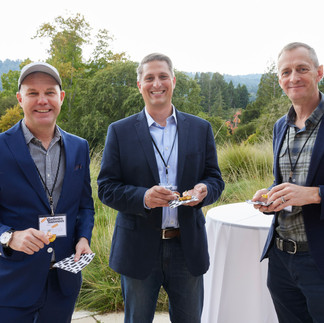Recently, the largest-ever Latvian business delegation visited the United States, marking a significant milestone for the country's entrepreneurial community. Among the participants were successful Latvian startups that have already made strides in the massive U.S. market. These businesses are encouraging others to take the leap and expand into what may seem like a distant and unreachable market. However, as they’ve discovered, breaking into the U.S. can be even easier than entering some European markets.
The Latvian Investment and Development Agency, in collaboration with "TechChill," organized a networking event with Silicon Valley investors during the visit. This event proved crucial in highlighting the potential for Latvian startups to make a name for themselves in the U.S.
Mikus Opelts, CEO of Latvian startup "Giraffe360," which is revolutionizing the real estate industry, shared his thoughts on the mission: “During the U.S. trade mission, I was thrilled to see Latvia’s collective efforts to pave the way for entering the American market. It also speaks volumes for the country’s image when high-ranking officials, including the President of Latvia, are part of the delegation. U.S. investors were pleasantly surprised by the presence of the President, which they found incredible, as it’s something they wouldn't imagine happening in Europe.”
"Giraffe360" simplifies the process for real estate professionals to capture high-quality photos, create floor plans, and offer virtual tours without relying on external service providers. The company has already established a solid presence in Europe and is now aiming for the U.S. market. “The U.S. is the largest single market. We serve real estate companies, and there are around three million real estate agencies in the U.S. There’s no comparable market of this size in Europe. For tech startups, America is also the ‘Holy Grail’—business valuations are much higher than in Europe,” explains Opelts.
Another participant, "Aerones," specializes in maintaining wind turbines using robotic arms. CEO Dainis Krūze points out that the size of the U.S. market is a key attraction: “The U.S. has a vast number of wind turbines within individual states. Entering the U.S. market is easier than Europe because Americans are more business-oriented. If you can provide value, they are open to using your product. Europeans tend to be more cautious,” Krūze adds, encouraging others to explore the U.S. market.
Mikus Krams, founder of "Trace.Space," shares a similar perspective: “When you’re solving a big problem with an innovative solution, people in the U.S. are willing to listen, even if it’s three guys from Riga. In Europe, we often encounter skepticism, with people saying our solution would be too difficult to implement, so it’s not worth considering. The U.S. isn’t just an interesting market; it’s a necessary one.”
"Trace.Space" develops a requirements management tool for system engineers in the industrial and mechanical engineering sectors. "Silicon Valley is home to the world’s best engineers, creating globally admired products. For almost a year, ‘Trace.Space’ has been working with Silicon Valley companies in the fields of mechanical engineering and autonomous driving. Thanks to this collaboration, we’ve created a unique solution that, using AI, significantly reduces the costs of developing complex products,” Krams explains, highlighting the benefits of working with U.S. partners.
The delegation of Latvian startups was supported by the team behind the "TechChill" startup and tech conference. Annija Mežgaile, head of "TechChill," emphasized the importance of ambition in driving the country’s competitiveness: “The successes and failures of Latvian entrepreneurs directly impact how competitive our country will be and how its economy will develop. Startups already contribute over 57 million euros annually to the state budget. The more ambitious companies we have that are not afraid to scale their businesses in foreign markets, the more prosperous our country will become.”
Latvia’s startup community continues to grow, and the U.S. market offers a wealth of opportunities for those willing to take on the challenge. With successful examples leading the way, Latvian entrepreneurs are proving that bold expansion can yield significant rewards.



































